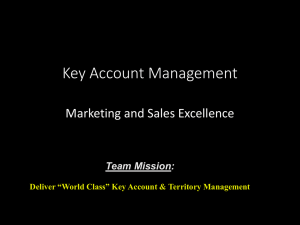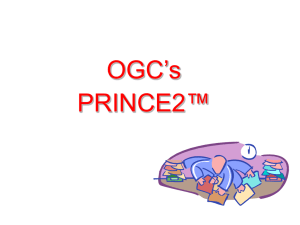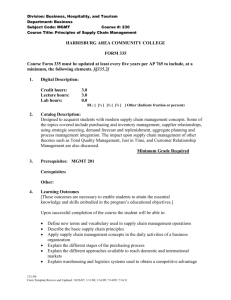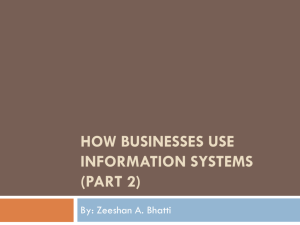Chapter 2
advertisement
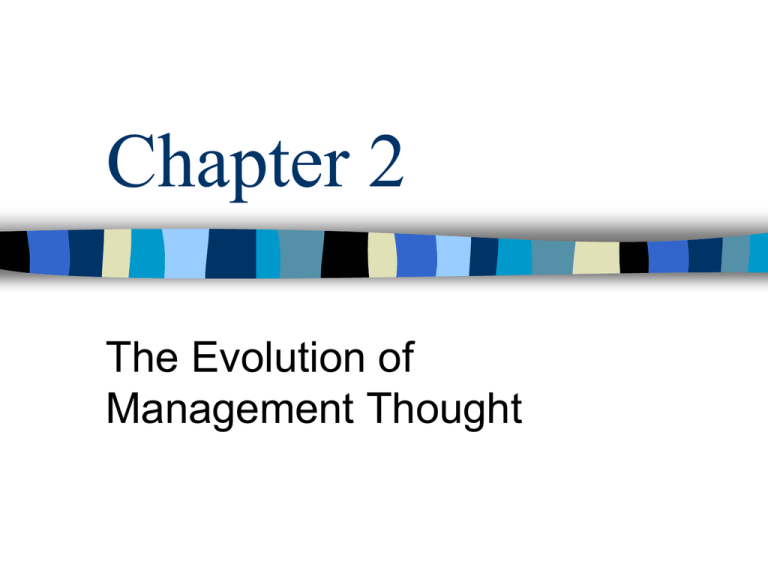
Chapter 2 The Evolution of Management Thought The Evolution of Management Theory MGMT 321 – Chapter 2 Job Specialization and the Division of Labor Adam Smith – 2 different ways to manufacture pins – Craft-style: each worker did all steps – Production: each worker specialized in one step Job Specialization – Different workers specialize in specific tasks over time MGMT 321 – Chapter 2 F.W. Taylor and Scientific Management Systematic study of the relationships between people and tasks to redesign the work process to increase efficiency Consists of 4 principles – – – – Study tasks to identify improvements Create written rules and SOPs Select and train workers carefully Establish fair performance standards and reward accordingly MGMT 321 – Chapter 2 Problems with Scientific Management Managers frequently implemented only the increased output side of Taylor’s plan – Workers did not share in the increased output Specialized jobs became very boring, dull – Workers ended up distrusting the Scientific Management method Workers could purposely “under-perform” – Management responded with increased use of machines and conveyors belts MGMT 321 – Chapter 2 The Gilbreths 1. 2. 3. Break up and analyze each action of a task into its component actions Find better ways to perform each component action Reorganize the component actions to be more efficient, at less cost in time and effort MGMT 321 – Chapter 2 Administrative Management Theory Study of how organizational structure affects efficiency and effectiveness Max Weber – Developed the principles of bureaucracy as a formal system designed to ensure efficiency and effectiveness MGMT 321 – Chapter 2 Weber’s Principles of Bureaucracy MGMT 321 – Chapter 2 Fayol’s Principles of Management Division of Labor – Jobs can have too much specialization leading to poor quality and worker dissatisfaction Authority and Responsibility – Both formal and informal authority Unity of Command – Employees should have only one boss Line of Authority – A clear chain of command from top to bottom MGMT 321 – Chapter 2 Fayol’s Principles of Management Centralization – The degree to which authority rests at the top Unity of Direction – A single plan of action to guide the organization Equity – The justice and fairness in the treatment of all employees Order – Arranging employees to be of the most value and to provide career opportunities MGMT 321 – Chapter 2 Fayol’s Principles of Management Initiative – Fostering creativity and innovation by encouraging employees to act on their own Discipline – Obedient, applied, respectful employees are necessary for the organization to function Remuneration of Personnel – An equitable uniform payment system that motivates contributes to organizational success MGMT 321 – Chapter 2 Fayol’s Principles of Management Stability of Tenure of Personnel – Long-term employment develops skills that improve organizational performance Subordination of Individual Interest – The interest of the organization takes precedence Esprit de corps – Foster comradeship, shared enthusiasm, and devotion to the common cause MGMT 321 – Chapter 2 Behavioral Management Theory The study of how managers should behave to: – Motivate employees – Encourage them to perform at high levels – Be committed to the achievement of organizational goals Mary Parker Follett – Concerned that Taylor ignored the human side of the organization MGMT 321 – Chapter 2 The Hawthorne Studies How work setting characteristics affect fatigue and performance – Regardless of whether the light levels were raised or lowered, worker productivity increased – Hawthorne effect – workers’ attitudes toward their managers affect performance – Implications – behavior of managers and workers is as important in explaining the level of performance as the technical aspects of the task MGMT 321 – Chapter 2 Douglas McGregor’s Theory X and Y MGMT 321 – Chapter 2 Management Science Theory Utilizes quantitative techniques to help managers maximize the use of organizational resources – Quantitative management – Operations management – Total Quality Management (TQM) – Management Information Systems (MIS) MGMT 321 – Chapter 2 Organizational Environment Theory The set of forces and conditions that operate beyond an organization’s boundaries but affect a manager’s ability to acquire and utilize resources MGMT 321 – Chapter 2 The Open-Systems View MGMT 321 – Chapter 2 Contingency Theory MGMT 321 – Chapter 2
